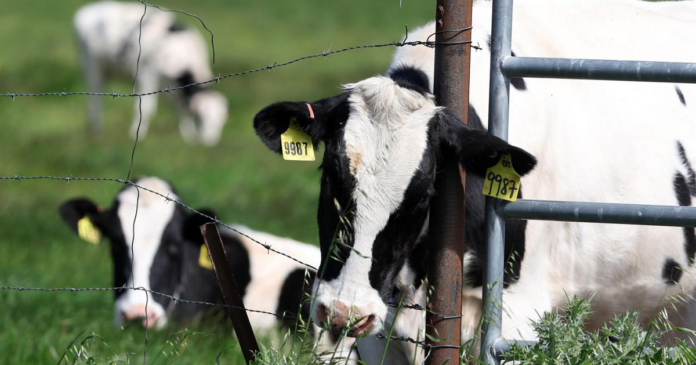The first known case of highly pathogenic avian influenza in Nebraska dairy cattle has been detected in a herd in the central part of the state, federal and state agriculture officials announced Monday.
The herd has been quarantined, according to the Nebraska Department of Agriculture and the U.S. Department of Agriculture Animal Plant Health Inspection Service. The National Veterinary Services Laboratories has confirmed that the strain of the virus is similar to a strain from California.
Dairy cattle typically recover from the virus with supportive care. Few deaths are associated with it.
The Nebraska case, according to federal officials, was initially detected through surveillance milk samples required before cattle are moved, under a federal order the agency issued in April 2024. The case was confirmed as a result of state tracing and investigation following the initial detection.
Detections of the virus in poultry and dairy cattle had slowed over the summer. While dairy cattle in a total of 17 states have been infected since the start of the outbreak in March 2024, cases have been seen in only a small number of states this year.
The federal agency is working closely with Nebraska officials to conduct additional on-farm investigations, including testing and collection of additional epidemiological information to better understand the case and limit further disease spread.
Listen now and subscribe: Apple Podcasts | Google Podcasts | Spotify | Stitcher | RSS Feed | SoundStack | All Of Our Podcasts
Dr. Roger Dudley, Nebraska’s state veterinarian, encouraged the state’s dairy producers to follow strict biosecurity protocols and contact their veterinarian immediately if their animals are exhibiting any symptoms of the virus. They also should report any unusual sick or dead wildlife.
Symptoms of highly pathogenic avian influenza or HPAI in dairy cattle include a decrease in food consumption, clear nasal discharge, drop in milk production, tacky or loose feces, lethargy, dehydration, fever, and thicker, concentrated milk.
While cases among humans in direct contact with infected animals are possible, the Centers for Disease Control and Prevention continues to believe that the threat to the general public remains low.
The USDA also stressed the continued safety of the commercial milk supply. Pasteurization, according to the agency, is effective in inactivating the virus, designated H5N1. Milk from impacted animals is not allowed to enter the human food supply.
Federal officials, too, recommend enhanced biosecurity measures for all dairy farms, particularly as the nation enters the fall migratory bird season. Migratory birds, particularly waterfowl, are thought to spread the virus along their routes.
Resources including biosecurity information are available for dairy producers at nda.nebraska.gov/animal/avian/ and from the USDA at https://www.aphis.usda.gov/livestock-poultry-disease/avian/avian-influenza/hpai-livestock Dairy cattle experiencing signs of HPAI should be reported to the state agriculture department at 402-471-2351 or the USDA at 866-536-7593.
julie.anderson@owh.com, 402-444-1066, twitter.com/julieanderson41
Be the first to know
Get local news delivered to your inbox!
* I understand and agree that registration on or use of this site constitutes agreement to its user agreement and privacy policy.
Julie Anderson
Get email notifications on {{subject}} daily!
Your notification has been saved.
There was a problem saving your notification.
{{description}}
Email notifications are only sent once a day, and only if there are new matching items.
Followed notifications
Please log in to use this feature
Log In
Don’t have an account? Sign Up Today




